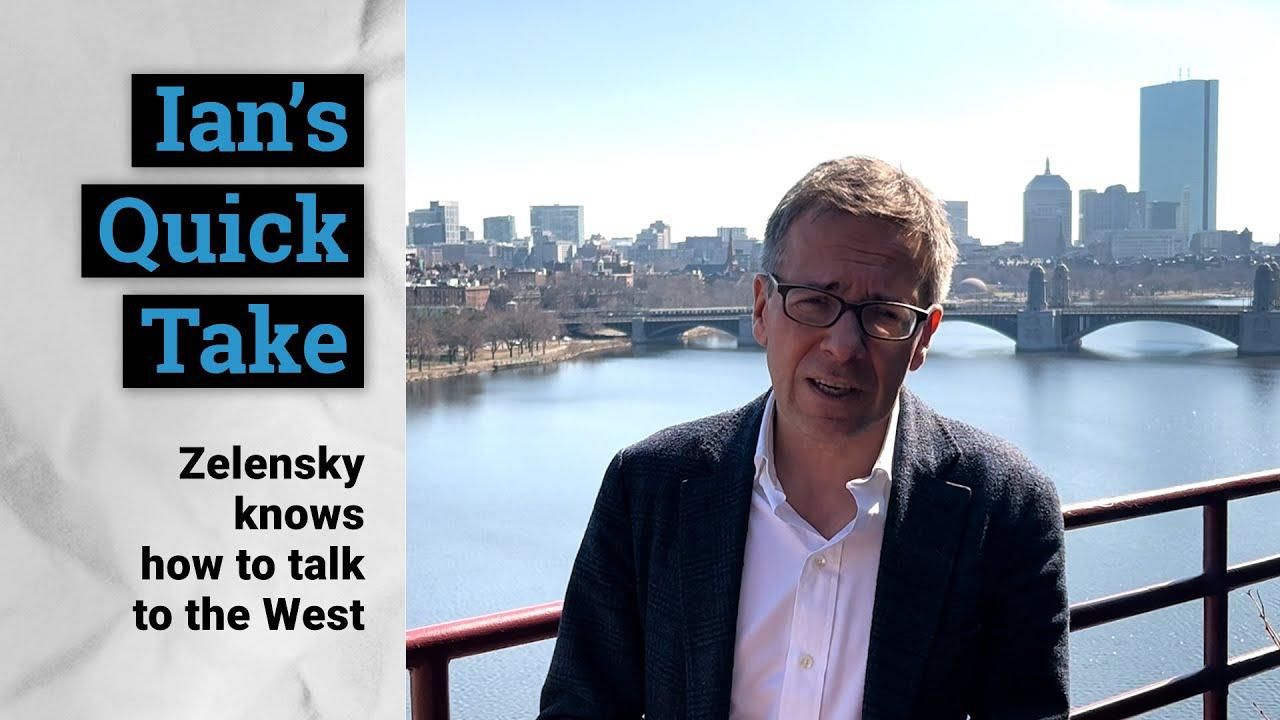
Ian Bremmer's Quick Take: Hi, everybody, Ian Bremmer here from Boston, I think you can tell. And more on the Russia-Ukraine issue every day.
I mean, first of all, we see President Zelensky talking now to the Canadians yesterday, to the American Congress today. His ability to directly engage with both popular groups, with the masses of these countries, with the mass media and with the members of Congress, members of Parliament to create forcing action, to provide more support for his government has been astonishingly strong over the past three weeks of war. And clearly is making a difference, not just in terms of awareness of Ukraine, but also in terms of the ability to get more support for the Ukrainians on the ground, which so far, not quite fighting the Russians to a standstill, but certainly allowing the Ukrainians more capacity to fend off the Russians than anyone would've otherwise expected.
No support really for the no-fly zone that Zelensky was talking about in Congress earlier today, though I'm sure it'll get some media, but a lot of support for a lot more military aid, a lot more humanitarian aid, a lot more broad economic support for the Ukrainians, which I think is going to continue and not just from the Americans, but from pretty much every advanced industrial democracy around the world. Heck, even the Japanese government at this point is sending defense equipment and is opening their borders to Ukrainian refugees. Really shows the power of Zelensky and also shows just how much Vladimir Putin has managed to antagonize and alienate pretty much every democratic leader around the world.
There are of course also negotiations that are going on right now. And increasingly those negotiations are becoming specific. They're talking about the fact that Ukraine would have neutral status. Ukraine would not be getting a direct ability to be a part of NATO. Of course, that wasn't happening anyway, but would get some direct defense guarantees from the United States, from the United Kingdom, from perhaps Turkey that are similar to the defense guarantees that they were ostensibly given back in 1994 with the Budapest Memorandum. You'll remember that was when they gave up their nuclear weapons. And in return, everyone said, "Oh, We're going to defend your territorial integrity,” except it wasn't worth the paper it was printed on. This time, they want real and binding defense guarantees, which the Russians in principle would also be standing up to.
Do I think this is plausible? Well, I'm glad they're negotiating. I will say that there is very little reason to put any actual trust in anything that Russian diplomats or the Russian president has to say. Remember, they were absolutely swearing up and down and directly to leaders of the world that there was going to be no invasion of Ukraine. We saw where that got. Furthermore, even if there were an agreement and the sides are still very far apart, even if there was a cease-fire, that doesn't mean that the Russians wouldn't break it and just take advantage of the ability to bring more troops, volunteers they're trying to grab from places like Syria, from Chechnya, from Russian troops in Armenia and Georgia being sent over. How do we know that a week later, we're just not going to see a better armed Russia that resumes its fight in Ukraine and into Kyiv?
We don't, the answer is we don't. So we should remain very skeptical about whether or not there's any possible deal that could potentially hold, but perhaps a more important point, leaving aside the war on the ground in Ukraine, that the relationship between the West and Russia is broken. And irrespective of any potential cease-fire or peace deal, the fact is the Europeans are going to take national security very differently. They will be spending much more. There will be forward deployments, permanent deployments in the Baltic states, for example.The Swedes, the Finns will want to join NATO. They're no going to be stopped from doing so by the NATO countries.
And that the dependence that the European economies had had on Russia is going away. And if you look at geography and you look at where the Russian population is located, where their infrastructure is located, and then look at Europe, you see that that's the natural market. Asia's not the natural market. So the impact this is going to have on a Russian economy that is about to default on its foreign debt is massive and permanent. And that is something that we're going to have to be thinking about a lot more going forward.
Anyway, a few minutes from me. Hope everyone's well. I'll talk to you all real soon.
- The limits of a China-Russia partnership - GZERO Media ›
- Zelensky takes center stage - GZERO Media ›
- The Graphic Truth: Ukraine war hits ruble hard - GZERO Media ›
- Zelensky's fate and Ukraine's future - GZERO Media ›
- Russia escalates in Donbas in push to take eastern Ukraine - GZERO Media ›
- Ian Bremmer: power of the "Goldilocks crisis" - GZERO Media ›
- Gillian Tett: Ukraine knows how to get what it wants from the West - GZERO Media ›
- Putin miscalculated on Ukraine, misled by post-Cold War worldview, says Ivan Krastev - GZERO Media ›